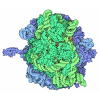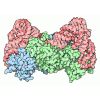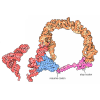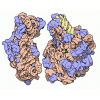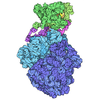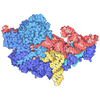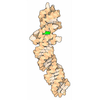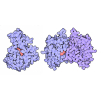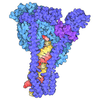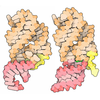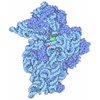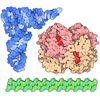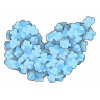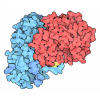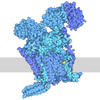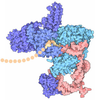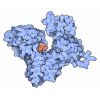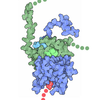[English] 日本語
 Yorodumi
Yorodumi- PDB-6ys5: Acinetobacter baumannii ribosome-amikacin complex - 30S subunit head -
+ Open data
Open data
- Basic information
Basic information
| Entry | Database: PDB / ID: 6ys5 | |||||||||
|---|---|---|---|---|---|---|---|---|---|---|
| Title | Acinetobacter baumannii ribosome-amikacin complex - 30S subunit head | |||||||||
 Components Components |
| |||||||||
 Keywords Keywords | RIBOSOME / antibiotic / amikacin / translation | |||||||||
| Function / homology |  Function and homology information Function and homology informationribosomal small subunit assembly / small ribosomal subunit / cytosolic small ribosomal subunit / tRNA binding / rRNA binding / structural constituent of ribosome / ribosome / translation / ribonucleoprotein complex / mRNA binding ...ribosomal small subunit assembly / small ribosomal subunit / cytosolic small ribosomal subunit / tRNA binding / rRNA binding / structural constituent of ribosome / ribosome / translation / ribonucleoprotein complex / mRNA binding / RNA binding / cytoplasm / cytosol Similarity search - Function | |||||||||
| Biological species |  Acinetobacter baumannii ATCC 19606 = CIP 70.34 = JCM 6841 (bacteria) Acinetobacter baumannii ATCC 19606 = CIP 70.34 = JCM 6841 (bacteria) | |||||||||
| Method | ELECTRON MICROSCOPY / single particle reconstruction / cryo EM / Resolution: 3 Å | |||||||||
 Authors Authors | Nicholson, D. / Edwards, T.A. / O'Neill, A.J. / Ranson, N.A. | |||||||||
| Funding support |  United Kingdom, 2items United Kingdom, 2items
| |||||||||
 Citation Citation |  Journal: Structure / Year: 2020 Journal: Structure / Year: 2020Title: Structure of the 70S Ribosome from the Human Pathogen Acinetobacter baumannii in Complex with Clinically Relevant Antibiotics. Authors: David Nicholson / Thomas A Edwards / Alex J O'Neill / Neil A Ranson /  Abstract: Acinetobacter baumannii is a Gram-negative bacterium primarily associated with hospital-acquired, often multidrug-resistant (MDR) infections. The ribosome-targeting antibiotics amikacin and ...Acinetobacter baumannii is a Gram-negative bacterium primarily associated with hospital-acquired, often multidrug-resistant (MDR) infections. The ribosome-targeting antibiotics amikacin and tigecycline are among the limited arsenal of drugs available for treatment of such infections. We present high-resolution structures of the 70S ribosome from A. baumannii in complex with these antibiotics, as determined by cryoelectron microscopy. Comparison with the ribosomes of other bacteria reveals several unique structural features at functionally important sites, including around the exit of the polypeptide tunnel and the periphery of the subunit interface. The structures also reveal the mode and site of interaction of these drugs with the ribosome. This work paves the way for the design of new inhibitors of translation to address infections caused by MDR A. baumannii. | |||||||||
| History |
|
- Structure visualization
Structure visualization
| Movie |
 Movie viewer Movie viewer |
|---|---|
| Structure viewer | Molecule:  Molmil Molmil Jmol/JSmol Jmol/JSmol |
- Downloads & links
Downloads & links
- Download
Download
| PDBx/mmCIF format |  6ys5.cif.gz 6ys5.cif.gz | 421.2 KB | Display |  PDBx/mmCIF format PDBx/mmCIF format |
|---|---|---|---|---|
| PDB format |  pdb6ys5.ent.gz pdb6ys5.ent.gz | 302.8 KB | Display |  PDB format PDB format |
| PDBx/mmJSON format |  6ys5.json.gz 6ys5.json.gz | Tree view |  PDBx/mmJSON format PDBx/mmJSON format | |
| Others |  Other downloads Other downloads |
-Validation report
| Arichive directory |  https://data.pdbj.org/pub/pdb/validation_reports/ys/6ys5 https://data.pdbj.org/pub/pdb/validation_reports/ys/6ys5 ftp://data.pdbj.org/pub/pdb/validation_reports/ys/6ys5 ftp://data.pdbj.org/pub/pdb/validation_reports/ys/6ys5 | HTTPS FTP |
|---|
-Related structure data
| Related structure data |  10892MC  6yhsC  6ypuC  6ysiC  6yt9C  6ytfC C: citing same article ( M: map data used to model this data |
|---|---|
| Similar structure data | |
| EM raw data |  EMPIAR-10406 (Title: Motion-corrected micrographs and extracted particle images of the 70S ribosome from the human pathogen Acinetobacter baumannii in complex with amikacin EMPIAR-10406 (Title: Motion-corrected micrographs and extracted particle images of the 70S ribosome from the human pathogen Acinetobacter baumannii in complex with amikacinData size: 177.7 Data #1: Motion-corrected micrographs of the 70S ribosome from the human pathogen Acinetobacter baumannii in complex with amikacin [micrographs - single frame] Data #2: Extracted particle images of the 70S ribosome from the human pathogen Acinetobacter baumannii in complex with amikacin [picked particles - multiframe - processed]) |
- Links
Links
- Assembly
Assembly
| Deposited unit | 
|
|---|---|
| 1 |
|
- Components
Components
-RNA chain , 3 types, 3 molecules 379
| #1: RNA chain | Mass: 500126.156 Da / Num. of mol.: 1 / Source method: isolated from a natural source Source: (natural)  Acinetobacter baumannii ATCC 19606 = CIP 70.34 = JCM 6841 (bacteria) Acinetobacter baumannii ATCC 19606 = CIP 70.34 = JCM 6841 (bacteria) |
|---|---|
| #2: RNA chain | Mass: 24346.498 Da / Num. of mol.: 1 / Source method: isolated from a natural source Details: E. coli fMet-tRNA from PDB 5AFI fitted into EM density - represents a mixture of tRNAs Source: (natural)  Acinetobacter baumannii ATCC 19606 = CIP 70.34 = JCM 6841 (bacteria) Acinetobacter baumannii ATCC 19606 = CIP 70.34 = JCM 6841 (bacteria) |
| #3: RNA chain | Mass: 1179.706 Da / Num. of mol.: 1 / Source method: isolated from a natural source Details: Mixture of mRNAs at the E-site, modelled as polyuridine Source: (natural)  Acinetobacter baumannii ATCC 19606 = CIP 70.34 = JCM 6841 (bacteria) Acinetobacter baumannii ATCC 19606 = CIP 70.34 = JCM 6841 (bacteria) |
-30S ribosomal protein ... , 7 types, 7 molecules dhjknot
| #4: Protein | Mass: 27972.461 Da / Num. of mol.: 1 / Source method: isolated from a natural source Source: (natural)  Acinetobacter baumannii ATCC 19606 = CIP 70.34 = JCM 6841 (bacteria) Acinetobacter baumannii ATCC 19606 = CIP 70.34 = JCM 6841 (bacteria)References: UniProt: D0CD03 |
|---|---|
| #5: Protein | Mass: 17733.699 Da / Num. of mol.: 1 / Source method: isolated from a natural source / Details: residues 126-145 modelled without side chains Source: (natural)  Acinetobacter baumannii ATCC 19606 = CIP 70.34 = JCM 6841 (bacteria) Acinetobacter baumannii ATCC 19606 = CIP 70.34 = JCM 6841 (bacteria)References: UniProt: D0C9P7 |
| #6: Protein | Mass: 14287.610 Da / Num. of mol.: 1 / Source method: isolated from a natural source Source: (natural)  Acinetobacter baumannii ATCC 19606 = CIP 70.34 = JCM 6841 (bacteria) Acinetobacter baumannii ATCC 19606 = CIP 70.34 = JCM 6841 (bacteria)References: UniProt: D0CG36 |
| #7: Protein | Mass: 11718.531 Da / Num. of mol.: 1 / Source method: isolated from a natural source Source: (natural)  Acinetobacter baumannii ATCC 19606 = CIP 70.34 = JCM 6841 (bacteria) Acinetobacter baumannii ATCC 19606 = CIP 70.34 = JCM 6841 (bacteria)References: UniProt: D0CCZ6 |
| #8: Protein | Mass: 13295.635 Da / Num. of mol.: 1 / Source method: isolated from a natural source Source: (natural)  Acinetobacter baumannii ATCC 19606 = CIP 70.34 = JCM 6841 (bacteria) Acinetobacter baumannii ATCC 19606 = CIP 70.34 = JCM 6841 (bacteria)References: UniProt: D0CD19 |
| #9: Protein | Mass: 11438.427 Da / Num. of mol.: 1 / Source method: isolated from a natural source Source: (natural)  Acinetobacter baumannii ATCC 19606 = CIP 70.34 = JCM 6841 (bacteria) Acinetobacter baumannii ATCC 19606 = CIP 70.34 = JCM 6841 (bacteria)References: UniProt: D0CD10 |
| #10: Protein | Mass: 10206.957 Da / Num. of mol.: 1 / Source method: isolated from a natural source Source: (natural)  Acinetobacter baumannii ATCC 19606 = CIP 70.34 = JCM 6841 (bacteria) Acinetobacter baumannii ATCC 19606 = CIP 70.34 = JCM 6841 (bacteria)References: UniProt: D0CD01 |
-Non-polymers , 1 types, 24 molecules 
| #11: Chemical | ChemComp-MG / |
|---|
-Details
| Has ligand of interest | N |
|---|
-Experimental details
-Experiment
| Experiment | Method: ELECTRON MICROSCOPY |
|---|---|
| EM experiment | Aggregation state: PARTICLE / 3D reconstruction method: single particle reconstruction |
- Sample preparation
Sample preparation
| Component | Name: Acinetobacter baumannii ribosome-amikacin complex - 30S subunit head Type: RIBOSOME / Entity ID: #1-#10 / Source: NATURAL |
|---|---|
| Source (natural) | Organism:  Acinetobacter baumannii ATCC 19606 = CIP 70.34 = JCM 6841 (bacteria) Acinetobacter baumannii ATCC 19606 = CIP 70.34 = JCM 6841 (bacteria) |
| Buffer solution | pH: 7.5 |
| Specimen | Embedding applied: NO / Shadowing applied: NO / Staining applied: NO / Vitrification applied: YES |
| Vitrification | Cryogen name: ETHANE |
- Electron microscopy imaging
Electron microscopy imaging
| Experimental equipment |  Model: Titan Krios / Image courtesy: FEI Company |
|---|---|
| Microscopy | Model: FEI TITAN KRIOS |
| Electron gun | Electron source:  FIELD EMISSION GUN / Accelerating voltage: 300 kV / Illumination mode: FLOOD BEAM FIELD EMISSION GUN / Accelerating voltage: 300 kV / Illumination mode: FLOOD BEAM |
| Electron lens | Mode: BRIGHT FIELD / Nominal magnification: 130000 X / Nominal defocus max: 2700 nm / Nominal defocus min: 800 nm |
| Image recording | Average exposure time: 10 sec. / Electron dose: 58 e/Å2 / Detector mode: COUNTING / Film or detector model: GATAN K2 SUMMIT (4k x 4k) |
| Image scans | Movie frames/image: 50 |
- Processing
Processing
| Software |
| ||||||||||||||||||||||||||||
|---|---|---|---|---|---|---|---|---|---|---|---|---|---|---|---|---|---|---|---|---|---|---|---|---|---|---|---|---|---|
| EM software |
| ||||||||||||||||||||||||||||
| CTF correction | Type: PHASE FLIPPING AND AMPLITUDE CORRECTION | ||||||||||||||||||||||||||||
| Symmetry | Point symmetry: C1 (asymmetric) | ||||||||||||||||||||||||||||
| 3D reconstruction | Resolution: 3 Å / Resolution method: FSC 0.143 CUT-OFF / Num. of particles: 51958 Details: Multi-body refinement was carried out in RELION 3.0 to obtain the final '30S subunit head' reconstruction. The mask used for this procedure is deposited with this entry. Symmetry type: POINT | ||||||||||||||||||||||||||||
| Atomic model building | Protocol: RIGID BODY FIT / Space: REAL / Target criteria: correlation coefficient | ||||||||||||||||||||||||||||
| Atomic model building | 3D fitting-ID: 1 / Source name: PDB / Type: experimental model
| ||||||||||||||||||||||||||||
| Refinement | Cross valid method: NONE Stereochemistry target values: GeoStd + Monomer Library + CDL v1.2 | ||||||||||||||||||||||||||||
| Displacement parameters | Biso mean: 30.19 Å2 | ||||||||||||||||||||||||||||
| Refine LS restraints |
|
 Movie
Movie Controller
Controller







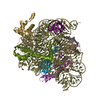
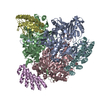
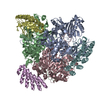
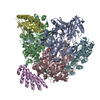

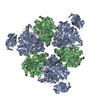

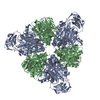
 PDBj
PDBj